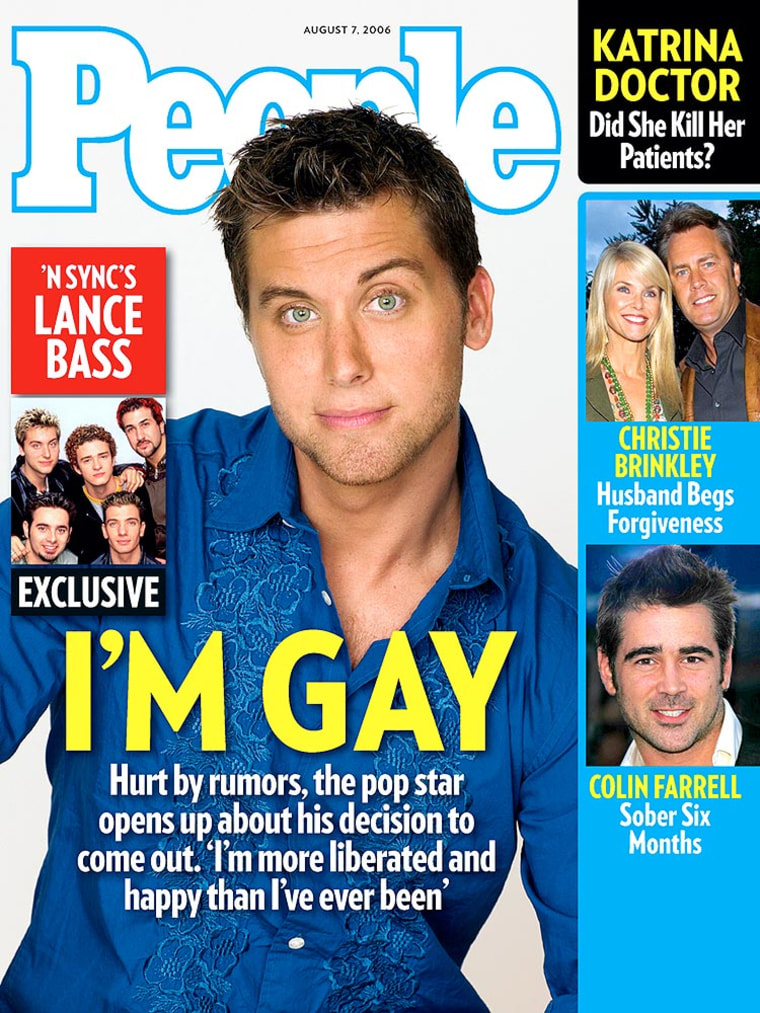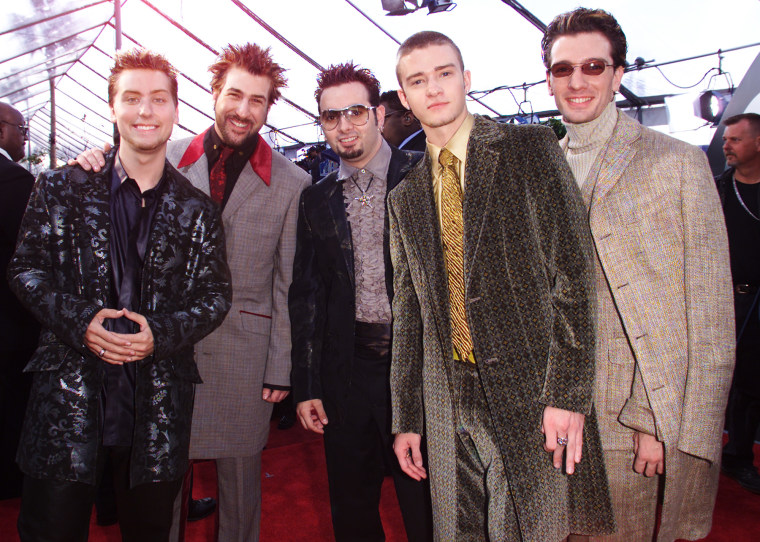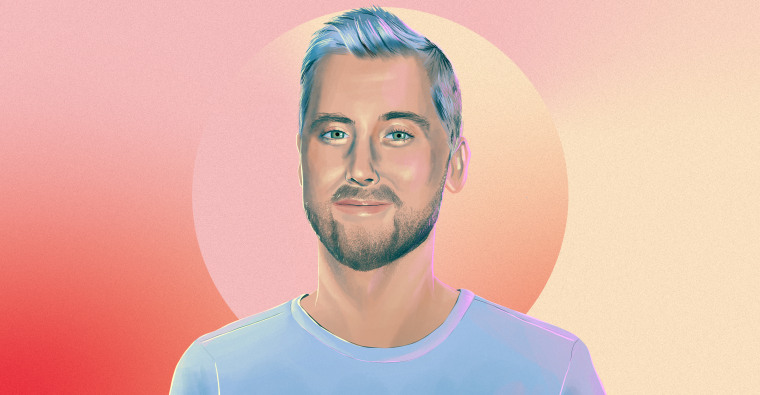Lance Bass probably knew that a question about “The Bachelor” was coming — well, a question about one specific Bachelor.
In April, Colton Underwood, a 29-year-old former NFL player who starred on the dating reality TV show in 2019, came out as gay. He appeared on both “The Bachelorette” and “Bachelor In Paradise” in 2018 before being cast to lead “The Bachelor,” where he set out to find a life partner among a few dozen female admirers. The news in the spring made headlines everywhere. Many praised Underwood for speaking his truth, while others found it controversial.

This may be somewhat familiar territory to Bass. It was almost 15 years ago when the then-27-year-old Bass came out publicly himself, appearing on the cover of the Aug. 7, 2006, edition of People magazine alongside a headline that read, “I’m gay.” It has since become a cultural touchstone as far as celebrity coming out stories go, like Ellen DeGeneres’ in 1997 on the cover of TIME or Elton John’s in the pages of Rolling Stone in 1976.
Plus, Bass’ story has some parallels to Underwood’s. Bass, who grew up in a religious family (like Underwood), rose to stardom in ‘N Sync, one of the biggest boy bands of all time, and crafted a brand around and made his money off his heartthrob status (also like Underwood).
“With Colton, this is something I can relate to,” Bass said. “The ‘Bachelor’ franchise is almost like the ‘N Sync franchise — it's the same type of market. And he comes from a family that he didn't think would accept it. Same with me. I understood that he was probably keeping his sexuality to himself just to please his family.”
Let’s pause on the topic of Underwood briefly — don’t worry, it will return — to revisit Bass’ upbringing in Mississippi and his coming out journey. It starts when he was 5, the age he said he knew he was gay.
“It was something that I had to grapple with my whole life and figure out how to survive,” he said. “And I think it's horrible for any kid to have to feel that any time in their life — they had to do something, fake themselves just to be able to survive this world.”
Throughout his adolescence, he said he didn’t tell a single person about his sexuality. He was raised in a Southern Baptist church and was told that people are gay, but it’s a sin to act on it.
“So I knew, ‘OK, I know that I'm gay, but as long as I don't act on it, then that's fine,’” he remembered. “But then, you start wanting to have relationships. And the very first person I told that I was gay, I didn’t really have to tell because it was my first boyfriend.”
It was something that I had to grapple with my whole life and figure out how to survive.
Bass estimated he was around 23 or 24 then, and the couple of years that they dated were in secret. His next partner after that was the first time he started telling his inner circle. By his third relationship, most of Bass’ friends knew he was gay.
“But the world didn't,” he added. “And I didn't know that they really cared or not to know.”
He’d eventually realize that sharing his sexuality publicly might be something he’d want to do. How that came to fruition, however, wasn’t exactly planned. It was Fourth of July in 2006 when he was visiting Provincetown, Massachusetts — also known as P-town, a prime vacation spot in the gay community.
“I didn't know that it was a gay town,” he said with a cackle. “People see me, they recognize me, but no one cared. And so I was like, this is great, this is my perfect entryway into gay society.”
When he returned from the trip, he had gotten a few phone calls.
“I guess I had talked to a reporter in the bathroom line. ... It was the first time I had told a stranger I was gay. He was like, ‘Are you Lance?’ He was like, ‘Are you gay?’ And I was like, ‘Yes, I am.’ That was very liberating of course, but then the magazine started calling.”
That’s when he decided he’d share his story with People. Asked whether he had hesitations — celebrities are always trying to establish boundaries, figure out what’s sharing and what’s oversharing — he said this felt like the “next natural step.”

“I've been in this business for a very long time,” he said. “I started at a young age so all I know is to be open about my life. And in a group like ‘N Sync, it was about the music, but it was also about the personality behind the band. Certain fans like certain guys in the group, so you felt an intimate relationship with the fans, that they deserve to know everything about you.
“Although they don’t, it's your own life, you can do whatever you want, but I did feel pressure to come clean with them. Especially because my music and my whole brand was women. Ninety percent of our fans were women. I definitely grappled with feeling that I was lying to everyone, which I was. I felt so bad that, you know, it really hurt my relationships and my family, my friends, the fans.”
Time to bring it back to Colton Underwood. The reality star was called out by critics for a similar reason. Did he mislead the women vying for his heart on “The Bachelor,” as well as his ex, Cassie Randolph, whom he gave his final rose to and dated for more than a year after?
“I understand it, for sure. But I mean, you can't blame Colton,” Bass said. “When you're given that gift and that opportunity, of course, most people are going to say, yeah, that's awesome. And same thing with me. I wasn't thinking about my sexuality when I joined ‘N Sync at 16 years old. But the conversation wasn't, ‘OK, before you join this band — are you gay? Because if you're gay, it's not going to make sense.’ You don't think like that.
“That’s why I say, hate the game, not the player. Colton, he had to do what he had to do to survive.”
Ninety percent of our fans were women. I definitely grappled with feeling that I was lying to everyone, which I was.
Another controversy that surrounded Underwood’s coming out story was a report soon after that he is filming a reality show with Netflix that documents his life as a newly out gay man. Bass translated that criticism as people being upset that there still aren’t enough efforts to diversify LGBTQ stories onscreen. But, in Bass’ opinion, any public visibility of a coming out story is only beneficial to the community.
“The more famous the person is, great, because you're going to reach people that just never would have heard these stories before,” he said.
After all, Bass didn’t have many examples to look to when he was growing up. Ellen DeGeneres was one of the only stars he’d seen come out publicly as gay, he said, and “it was not a great one at the time.”
“She went through a lot of hell,” he added. “She confirmed to me exactly what everyone had been telling me, is if you come out and you're gay in this business, you will be ostracized and you won't work. It was a truth, and that one definitely hurt.
“But it's so great now today, you have so many great people to look up to. There's so many examples on television and film right now. So I just love that there's very successful coming out stories that encourage other kids to be able to be themselves.”
Let’s not forget, Bass himself is one of those role models. And it’s a privilege he takes quite seriously.
“I'm honored to be in that position. I've tried to be a good example of being just an average gay person,” he said. “And I've learned that just being yourself really just does help.”
On the topic of being a guiding voice for young people, the conversation pivots to social media, where so many in the LGBTQ community are looking for inspiration and support. But at the same time, social media can be a cesspool of hate and bullying. As far as how that may affect somebody’s journey, Bass weighed the good and the bad.
“It’s great for your coming out to get the word out, educate people, tell your friends and family all at one time,” he said. “You don't have to have an individual conversation with every single person explaining yourself, which is like the worst part of coming out. … But with a younger person especially coming out, and being on social media, it can be hard because you haven't really grown that thick skin yet.
“Words really do hurt. You can say it rolls off easy, but it doesn't, it sticks. You heard it and it’s there.”
Asked for his advice to the next generation, he acknowledged that though each person’s story is different and safe spaces may not be available to everyone, he said to consider beginning with confiding in one person.
“Just being able to rip the Band-Aid off and say it out loud the first time, ‘I am gay,’ to someone that you really trust — it changes everything,” he said. “The ball starts rolling, there's no going back. And it's scary, but it's amazing when you see that your friends, they don't care. They just love you.”
This LGBTQ Pride Month 2021, TODAY is highlighting the LGBTQ trailblazers in pop culture who paved the way, along with the trendsetters of today who are making a name for themselves. By examining their experiences individually, we see how all of their stories are tied to one another in a timeline of queer history that takes us from where we were to where we stand today.



